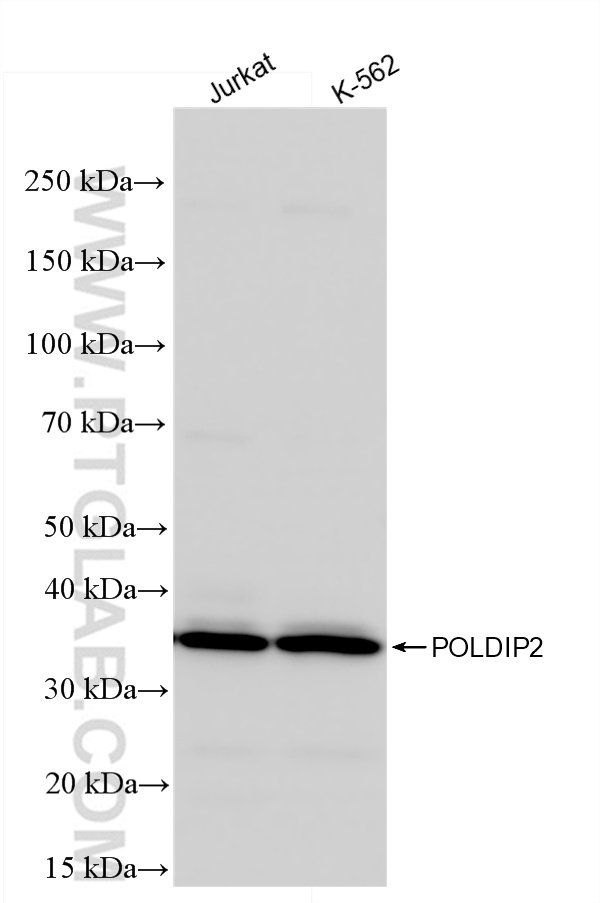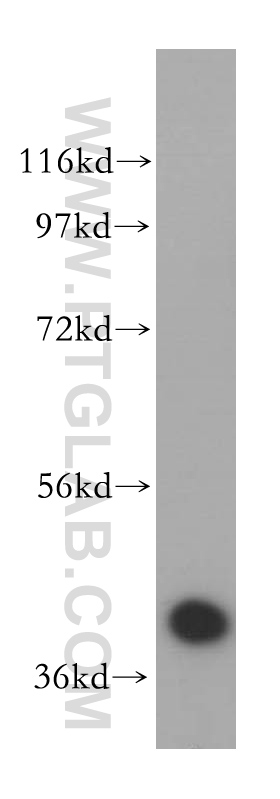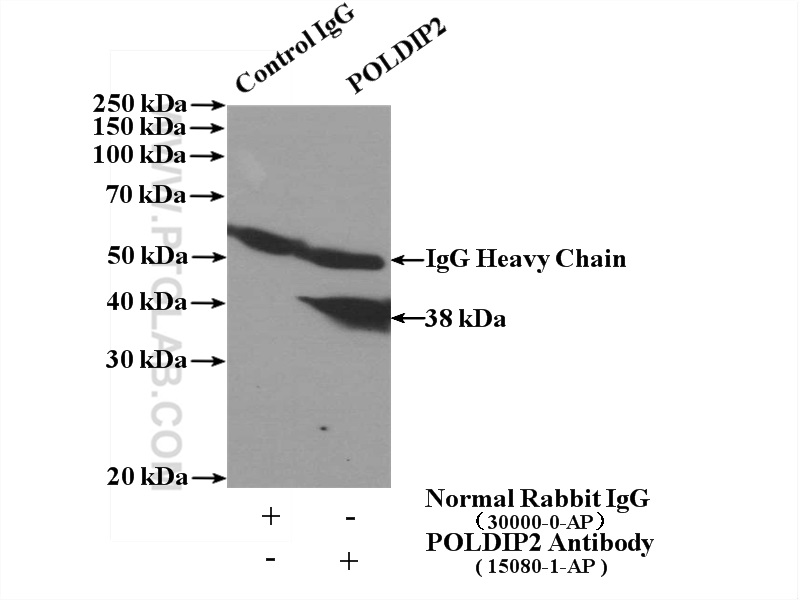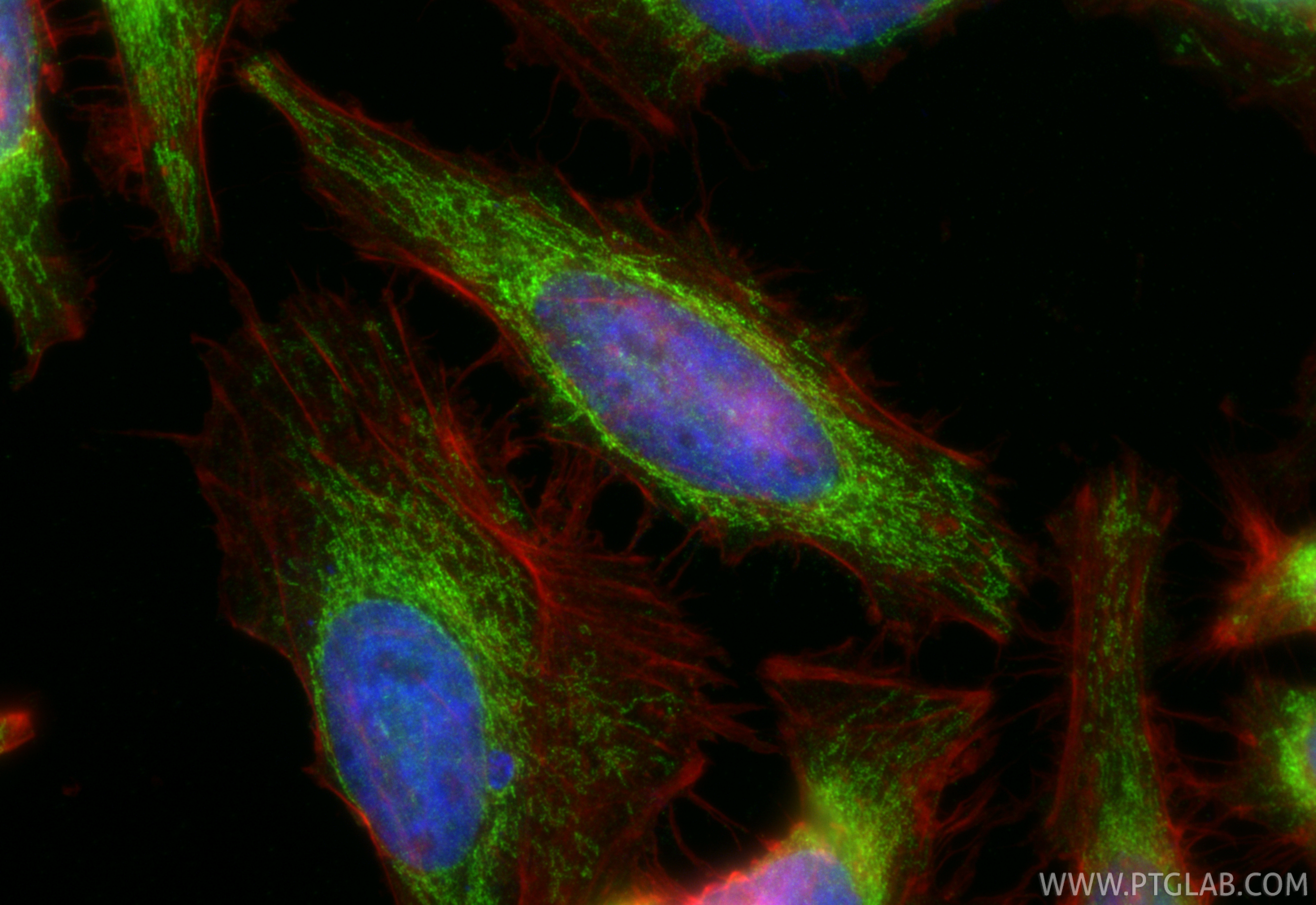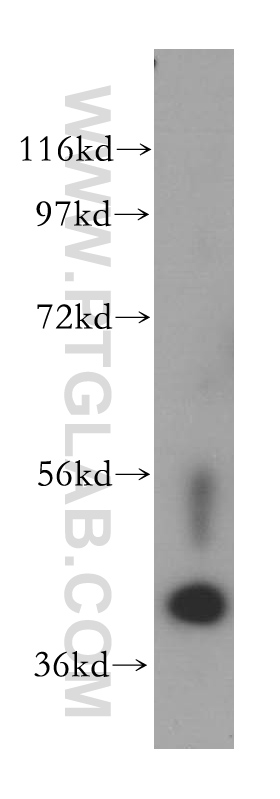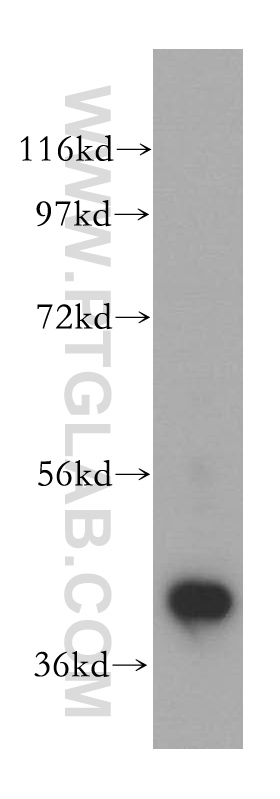验证数据展示
经过测试的应用
| Positive WB detected in | Jurkat cells, HeLa cells, HepG2 cells, K-562 cells |
| Positive IP detected in | HeLa cells |
| Positive IHC detected in | human stomach cancer tissue Note: suggested antigen retrieval with TE buffer pH 9.0; (*) Alternatively, antigen retrieval may be performed with citrate buffer pH 6.0 |
| Positive IF/ICC detected in | HeLa cells |
推荐稀释比
| 应用 | 推荐稀释比 |
|---|---|
| Western Blot (WB) | WB : 1:500-1:2000 |
| Immunoprecipitation (IP) | IP : 0.5-4.0 ug for 1.0-3.0 mg of total protein lysate |
| Immunohistochemistry (IHC) | IHC : 1:50-1:500 |
| Immunofluorescence (IF)/ICC | IF/ICC : 1:50-1:500 |
| It is recommended that this reagent should be titrated in each testing system to obtain optimal results. | |
| Sample-dependent, Check data in validation data gallery. | |
发表文章中的应用
| WB | See 4 publications below |
| IF | See 1 publications below |
产品信息
15080-1-AP targets POLDIP2 in WB, IHC, IF/ICC, IP, ELISA applications and shows reactivity with human, mouse, rat samples.
| 经测试应用 | WB, IHC, IF/ICC, IP, ELISA Application Description |
| 文献引用应用 | WB, IF |
| 经测试反应性 | human, mouse, rat |
| 文献引用反应性 | human, mouse, rat |
| 免疫原 |
CatNo: Ag7154 Product name: Recombinant human POLDIP2 protein Source: e coli.-derived, PGEX-4T Tag: GST Domain: 1-368 aa of BC000655 Sequence: MAACTARRALAVGSRWWSRSLTGARWPRPLCAAAGAGAFSPASTTTTRRHLSSRNRPEGKVLETVGVFEVPKQNGKYETGQLFLHSIFGYRGVVLFPWQARLYDRDVASAAPEKAENPAGHGSKEVKGKTHTYYQVLIDARDCPHISQRSQTEAVTFLANHDDSRALYAIPGLDYVSHEDILPYTSTDQVPIQHELFERFLLYDQTKAPPFVARETLRAWQEKNHPWLELSDVHRETTENIRVTVIPFYMGMREAQNSHVYWWRYCIRLENLDSDVVQLRERHWRIFSLSGTLETVRGRGVVGREPVLSKEQPAFQYSSHVSLQASSGHMWGTFRFERPDGSHFDVRIPPFSLESNKDEKTPPSGLHW 种属同源性预测 |
| 宿主/亚型 | Rabbit / IgG |
| 抗体类别 | Polyclonal |
| 产品类型 | Antibody |
| 全称 | polymerase (DNA-directed), delta interacting protein 2 |
| 别名 | HSPC017, p38, PDIP38, POLD4, Polymerase delta-interacting protein 2 |
| 计算分子量 | 42 kDa |
| 观测分子量 | 38 kDa |
| GenBank蛋白编号 | BC000655 |
| 基因名称 | POLDIP2 |
| Gene ID (NCBI) | 26073 |
| RRID | AB_2166599 |
| 偶联类型 | Unconjugated |
| 形式 | Liquid |
| 纯化方式 | Antigen affinity purification |
| UNIPROT ID | Q9Y2S7 |
| 储存缓冲液 | PBS with 0.02% sodium azide and 50% glycerol, pH 7.3. |
| 储存条件 | Store at -20°C. Stable for one year after shipment. Aliquoting is unnecessary for -20oC storage. |
背景介绍
POLDIP2(Polymerase delta-interacting protein 2) is also named as PDIP38, POLD4. It is as a unique positive regulator of Nox4 via its association with p22phox and together with Nox4, has profound effects on Rhodependent cytoskeletal remodeling. It is also as a regulator of cell division. It consists of 368 amino acids and has a predicted molecular mass of 42 kDa, with a potential signal peptide cleavage site after the first N-terminal 48 residues, which would result in a protein of 37 kDa(PMID:19574552). Endogenous human and rat POLDIP2 localized to the nucleus, plasma membrane, and cytoplasm(PMID:17623671).
实验方案
| Product Specific Protocols | |
|---|---|
| IF protocol for POLDIP2 antibody 15080-1-AP | Download protocol |
| IHC protocol for POLDIP2 antibody 15080-1-AP | Download protocol |
| IP protocol for POLDIP2 antibody 15080-1-AP | Download protocol |
| WB protocol for POLDIP2 antibody 15080-1-AP | Download protocol |
| Standard Protocols | |
|---|---|
| Click here to view our Standard Protocols |
发表文章
| Species | Application | Title |
|---|---|---|
EMBO J Poldip2 promotes mtDNA elimination during Drosophila spermatogenesis to ensure maternal inheritance | ||
Proc Natl Acad Sci U S A DNA polymerase δ-interacting protein 2 is a processivity factor for DNA polymerase λ during 8-oxo-7,8-dihydroguanine bypass. | ||
Cell Cycle PDIP38 is translocated to the spliceosomes/nuclear speckles in response to UV-induced DNA damage and is required for UV-induced alternative splicing of MDM2. | ||
Cells Inactivity of Peptidase ClpP Causes Primary Accumulation of Mitochondrial Disaggregase ClpX with Its Interacting Nucleoid Proteins, and of mtDNA. | ||
Life Sci Poldip2 Aggravates inflammation in diabetic retinopathy by impairing mitophagy via the AMPK/ULK1/Pink1 pathway |

